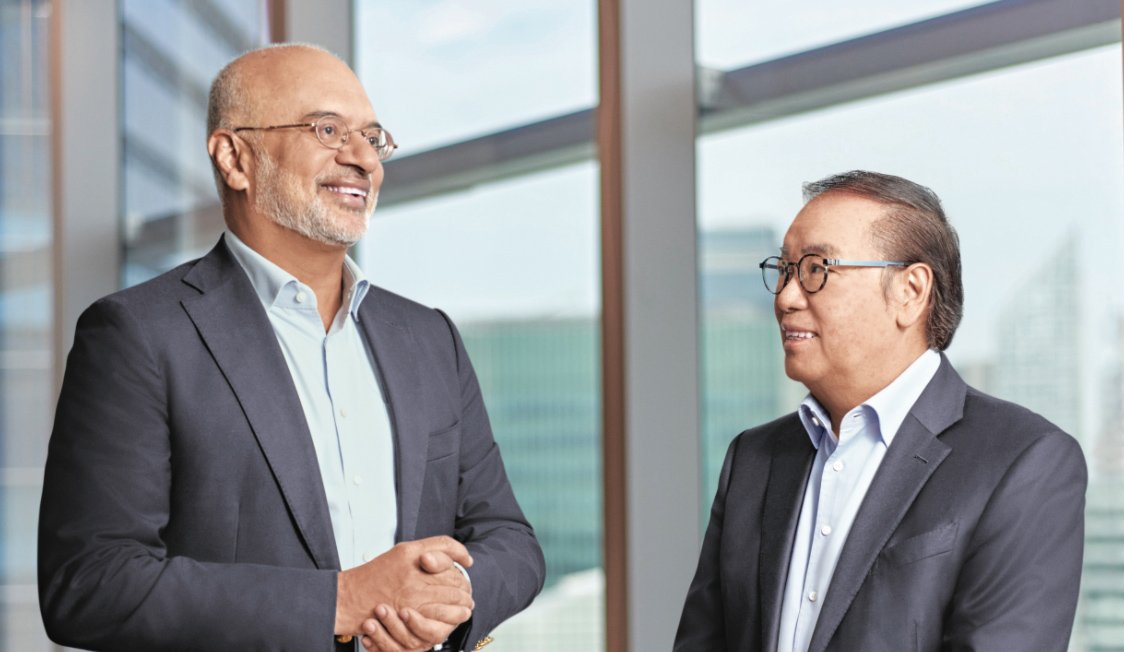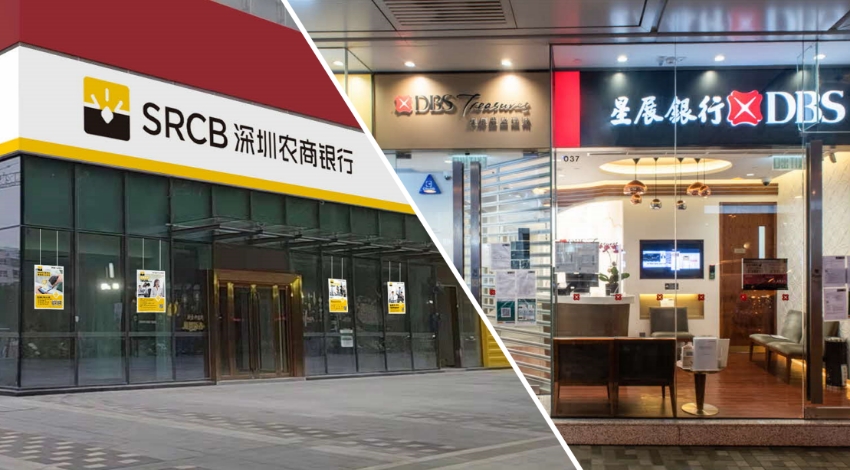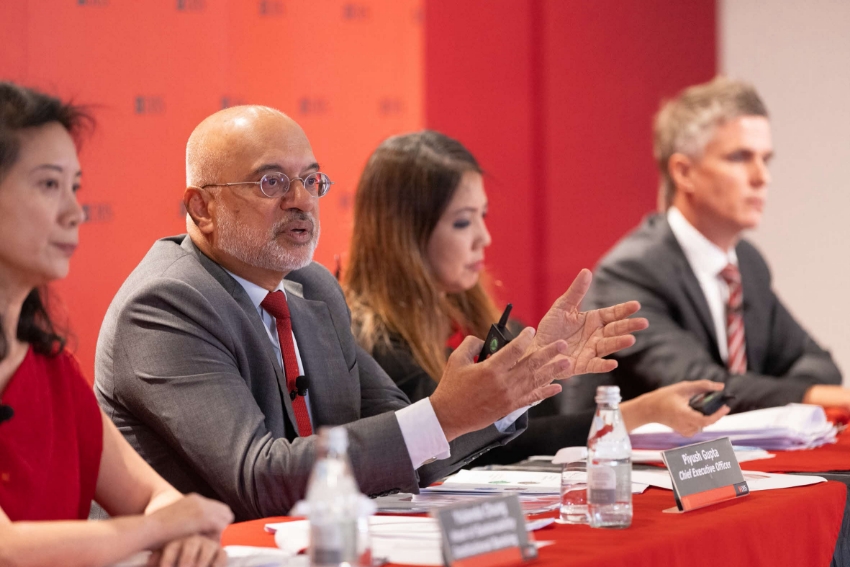DBS Group Holdings Ltd
Annual Report 2022
Listen to this chapter
0:00 / 0:00

Total income
Total income crossed SGD 16 billion for the first time.
Net profit
Net profit rose 20% to a record SGD 8.19 billion, as we benefitted from higher interest rates and reaped the rewards of structural changes made over the years.
Dividend
The Board proposed a final dividend of 42 cents per share, and a special dividend of 50 cents per share, bringing the full-year dividend to SGD 2.00 per share.
Return on equity
Return on equity climbed from 12.5% to a new high of 15.0%
The global economy faced multiple threats in 2022 – escalating geopolitical tensions, stubbornly high inflation, stalling growth and roiling financial markets.
Supply chain disruptions – an issue amid the Covid pandemic of the last two years – were further exacerbated by the Ukraine war. This contributed to rising food, commodities and energy prices.
To fight decades-high inflation, the US Federal Reserve embarked on its most aggressive monetary tightening since the early 1980s. Altogether, it hiked rates seven times in 2022, raising short-term borrowing costs by 425 basis points to 4.25-4.50%, the highest level in 15 years. Many major central banks around the world similarly followed suit. These moves had a chilling effect on equity and bond markets.
DBS’ key markets Singapore and Hong Kong – being small, open economies – were impacted by slowing external demand. Singapore’s economy grew 3.6% in 2022, from 8.9% the year before. Hong Kong’s economy shrank by 3.5%. With its strict zero-Covid policy and property market slump, China remained in the doldrums.
Against this backdrop, we had yet another excellent year, with solid financial performance and continued delivery against key scorecard goals.
DBS also continued to cement its global standing, being named by Global Finance as "World's Best Bank". This made it the fifth consecutive year we had been lauded as the best in the world.
For the year, DBS delivered record total income of SGD 16.5 billion. Net profit rose 20% to an all-time high of SGD 8.19 billion. Return on equity (ROE), at 15%, was not just a record, but also significantly higher when compared to previous highs around the 12-13% range.
Earnings were propelled by tailwinds from a rising interest rate environment, with net interest margin increasing after three years of decline. Notwithstanding the rise in borrowing costs for corporates and individuals, loans grew 4% in constant-currency terms to SGD 415 billion. Overall, net interest income rose 30% to SGD 10.9 billion.
Non-interest income, however, was a drag, declining 3% to SGD 5.56 billion. While card fees increased 20% with travel spending gradually returning to pre-pandemic levels, this was more than offset by lower wealth management and investment banking fees amid the uncertain market environment.
DBS’ solid financial performance reflects structural shifts made to our franchise in the last decade, whether the buildout of higher-return business lines or the pervasive digital transformation we embarked on starting 2014, and which carry through till today.
Consumer Banking/ Wealth Management had a solid year, with total income up 25% to a record SGD 6.65 billion. Wealth Management customer segment income rose 20% as higher interest rates benefitted deposit income, more than offsetting a decline in investment product sales. Assets under management increased by 3% in constant currency terms to SGD 297 billion, boosted by a doubling of net new monies to SGD 24 billion. Our consumer banking franchise also did well.
Institutional Banking, which saw income rise 28% to a record SGD 7.69 billion, was buoyed by corporate lending, cash management and treasury customer sales. Growth in non-trade loans was broad-based across industries and geographies. Our early investment in digital transactional capabilities continued to pay off, as we won over 800 cash management mandates in 2022. Corporate operating balances also rose significantly. Income from Treasury Markets normalised from the previous year's exceptional levels to SGD 1.17 billion.
Across the franchise, asset quality remained resilient, with the non-performing loan ratio at 1.1%, from 1.3% previously. During the year, we did a range of stress tests under conservative assumptions. These included stress-testing oil at USD 200 a barrel, interest rates at 6-7% for our SME portfolio and a deep recession impacting the cashflow of our customers by 30%. Across most of these situations, we are confident that asset quality is robust.
In a turbulent time for the global economy, DBS continued to be recognised for our safety, and liquidity was healthy. Underlining the solidity of our franchise, DBS was named by Global Finance as "Safest Bank in Asia" for the 14th consecutive year.
As an Asia-centric bank, in the long term, DBS needs to be more deeply embedded in one or more of our four markets outside of Singapore and Hong Kong, which include China, India, Indonesia and Taiwan.
In 2022, notwithstanding the China-US trade tensions and China’s zero-Covid policy, DBS continued to make headway in growing its Greater Bay Area (GBA) franchise. Since launching our GBA strategy in 2018, our large-corporate business targeting companies in China’s strategic industries including high-end manufacturing, technology and the new economy, has seen robust growth. Our SME business in the GBA region has also performed well. In the wealth space, DBS Bank (Hong Kong) now provides investment products and solutions to customers from DBS China, Postal Savings Bank of China and Shenzhen Rural Commercial Bank. This makes DBS the only bank with three Southbound Wealth Management Connect partners.

DBS is the only bank with three Southbound Wealth Management Connect partners.
Following the amalgamation of Lakshmi Vilas Bank (LVB) with DBS India in late 2020, all efforts have been focused on integrating both franchises smoothly. In 2022, this involved optimising the combined DBS/ LVB branch network, rebranding the LVB branches, and migrating all former LVB customers to DBS technology systems and operating platforms. With our enlarged presence of over 520 branches across 350 locations, 2.5 million retail customers and 15,000 corporate customers, we now have a strong platform from which to accelerate growth. Strategic partnerships including those with Bajaj Finserv to launch our first-ever credit card in India and with ODeX to provide straight-through credit solutions to freight forwarders, continued to scale well. These initiatives helped deliver stronger consumer and SME assets growth, as well as higher income and profitability.
In Taiwan, where DBS agreed to acquire Citi's consumer banking business, we are on track to complete and integrate the acquisition by August 2023. The acquisition will accelerate DBS Taiwan’s growth by at least 10 years, making it Taiwan’s largest foreign bank by assets. Material synergies will be realised from the combined entity’s enlarged scale.
In November, DBS opened a representative office in Bangladesh, bringing the bank’s international presence to 19 markets globally. Bangladesh is an attractive investment destination for companies in various sectors, such as power, energy, and transport and logistics. The establishment of DBS Dhaka will provide further impetus to the bank’s activities and enable greater market connectivity to DBS’ customers globally.
While DBS was ahead of the curve in transforming digitally, we recognise that digitalisation has become table stakes at most banks. However, there are three areas in which we have invested that continue to be differentiating.
The first is the industrialisation of artificial intelligence (AI)/ machine learning (ML) and data analytics usage across the bank. Our 260 use cases span customer-facing businesses such as consumer and SME banking, and support functions including Legal and Compliance, and Human Resources. For example, DBS sends 45 million hyper-personalised nudges each month to customers across the region with suggestions on how to make their money work harder. In the SME space, AI/ ML is used to provide businesses with early warning signals of potential credit stress. In 2022, the revenue uplift from our AI/ ML initiatives was about SGD 150 million, more than double that from the previous year.
The second is our ecosystem strategy, which has allowed us to scale up our business in the large Asian markets without high customer acquisition costs. DBS nearly doubled our ecosystem-led consumer finance lending in 2022. This was made possible through our partnerships with companies such as ByteDance, Ctrip, Home Credit and Kredivo in markets like China and Indonesia. In institutional banking, we also had good traction in onboarding large platform companies, and through our API suite, financing their extensive supply chains digitally.
The third is in the way we manage. While technology is an enabler, companies need to focus on the customer and speed to market to win. This requires a workforce that is agile, nimble, experimental, learning and willing to take risks. A big focus at DBS has been on enabling this internally.
Previously, we had programmed change within the organisation such that our employees are trained to put the customer at the heart of all we do. In the past two years, we took this up a notch with the introduction of a new operating model “Managing through Journeys” (MtJs). With MtJ, we re-architected our most important customer processes – such as those around credit cards, wealth management, consumer finance, transactional foreign exchange and SMEs – horizontally. Through the formation of cross-functional squads which are guided by data-driven control towers, we have become more agile in delivering new products, and responding to customer pain points and needs. This has translated to improved customer satisfaction, faster turnaround times and positive revenue impact.
Our conviction has always been that our net-zero commitment, made in October 2021, must be supported by a clear and detailed roadmap and plan.
In September 2022, DBS unveiled this plan, which is one of the most comprehensive in scope in the global banking industry. Specifically, we set 2030 interim decarbonisation targets – that are aligned with science-informed decarbonisation glidepaths – for seven sectors. These are power, oil and gas, automotive, aviation, shipping, steel and real estate. Data coverage targets were also set for two sectors, food and agribusiness, and chemicals. The nine sectors represent the most carbon-intensive institutional banking segments financed by DBS and constitute the vast majority of the Institutional Banking Group's (IBG's) financed emissions.

DBS CEO Piyush Gupta (second from left) announcing the bank’s decarbonisation targets.
As part of the implementation roadmap, DBS will proactively partner our customers with advisory and financial solutions to accelerate their transition to a lower-carbon future. We are confident that many will be willing to come along with us on the journey. This confidence is borne out by our fast-growing sustainable finance book. We had originally set a target to do SGD 50 billion in sustainable finance loans by 2024. As at end-2022, our sustainable finance portfolio was SGD 61 billion, exceeding our target well ahead of 2024.
In line with efforts to embed sustainability in our business practices and operations, we refurbished an old office in Newton into Singapore’s first net-zero building by a bank. We also launched an in-house café at our headquarters that minimises the bank’s carbon footprint and gives new life to food waste. These efforts contributed towards DBS achieving carbon neutrality in our operations as at end-2022.
On the social agenda, the new Community Impact chapter of DBS Foundation aims to foster a more equitable and inclusive society. A total of SGD 5.6 million was committed towards 10 inaugural programmes across our core markets of Singapore, China, Hong Kong, India, Indonesia and Taiwan.
One such programme is in partnership with Haqdarshak Empowerment Solutions, which will provide digital and financial literacy courses, and access to social welfare schemes, to 200,000 marginalised individuals in India.
For DBS’ commitment to sustainability, the bank was recognised by Global Finance as the global winner for “Financial Leadership in Sustaining Communities”. DBS was also named to the Bloomberg Gender Equality Index and the FTSE4Good Developed Index for the sixth consecutive year.
We would like to express our gratitude to Ho Tian Yee, who is stepping down as a board member in March 2023, for his invaluable contributions. Since joining the DBS Board in 2011, Tian Yee has served in several capacities including as Lead Independent Director and Chairman of the Nominating Committee. We have benefitted greatly from his wisdom and insights through the years.
Underscoring our deep bench strength, we are pleased that we were able to fill two Country Head roles from our slate of internal candidates when the incumbents retired.
Veteran banker Ginger Cheng succeeded Neil Ge when he retired as Country CEO of DBS China. A Chinese citizen, Ginger has had a distinguished 20-year career in DBS spanning Hong Kong and China. Under her leadership, DBS’ IBG business in China had grown exponentially, with increased connectivity across the region.
Lim Chu Chong, a career DBS banker, took over as President Director of PT Bank DBS Indonesia, succeeding Paulus Sutisna. A seasoned corporate banker, Chu Chong had held various roles in DBS including Regional Head of SME Banking, Head of IBG in China and Chief Operating Officer of IBG. Between 2011 and 2016, he was also non-Independent Commissioner of DBS Indonesia.
Given the record profit and strong capital base, the Board has proposed a final dividend of 42 cents per share and a special dividend of 50 cents a share, bringing the full-year dividend to SGD 2.00 per share. Barring unforeseen circumstances, the annualised dividend going forward will be SGD 1.68 per share.
While uncertainties remain, macroeconomic conditions are improving. Global inflation is expected to decline this year. China's reopening paves the way for a rebound in economic activity. The IMF recently upgraded its growth forecast for 2023 from 2.7% to 2.9%, though this is still below 3.4% in 2022.
Although we remain watchful, we take heart that our loan pipeline looks healthy. If animal spirits return to markets, we should also see some upside to fee income. Barring any unexpected shocks to the global economy, DBS’ ROE will comfortably be above 15%.
Despite the collapse in market and fintech valuations, our ambition to become more like a technology company also remains intact. This reflects a belief that the future of finance will be underpinned by technology. As we look ahead, we will continue to cement our digital banking leadership, while strategically placing our bets in emerging technologies. It is also imperative that we remain focused on advancing the sustainability agenda and executing on our net-zero commitments.
2022 was a breakout year for DBS, with ROE significantly surpassing previous records. This was the result of structural changes made over the years to transform the franchise. We have demonstrated over the past decade a track record of solid performance. In an increasingly fractured and unpredictable world, DBS will continue to be a different kind of bank – one that is trusted, purpose-driven and innovation-led so our customers can Live more, Bank less.

Peter Seah
Chairman
DBS Group Holdings

Piyush Gupta
Chief Executive Officer
DBS Group Holdings